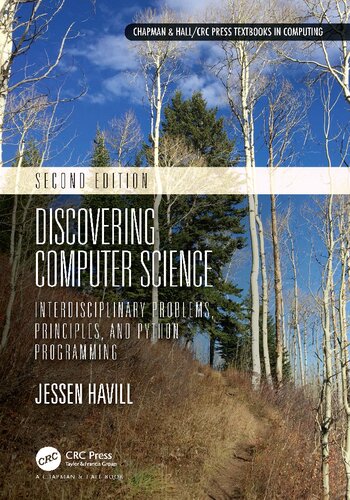

Most ebook files are in PDF format, so you can easily read them using various software such as Foxit Reader or directly on the Google Chrome browser.
Some ebook files are released by publishers in other formats such as .awz, .mobi, .epub, .fb2, etc. You may need to install specific software to read these formats on mobile/PC, such as Calibre.
Please read the tutorial at this link. https://ebooknice.com/page/post?id=faq
We offer FREE conversion to the popular formats you request; however, this may take some time. Therefore, right after payment, please email us, and we will try to provide the service as quickly as possible.
For some exceptional file formats or broken links (if any), please refrain from opening any disputes. Instead, email us first, and we will try to assist within a maximum of 6 hours.
EbookNice Team

Status:
Available4.4
32 reviews"Havill's problem-driven approach introduces algorithmic concepts in context and motivates students with a wide range of interests and backgrounds."
-- Janet Davis
, Associate Professor and Microsoft Chair of Computer Science, Whitman College"This book looks really great and takes exactly the approach I think should be used for a CS 1 course. I think it really fills a need in the textbook landscape."
--
Marie desJardins, Dean of the College of Organizational, Computational, and Information Sciences, Simmons University"Discovering Computer Science is a refreshing departure from introductory programming texts, offering students a much more sincere introduction to the breadth and complexity of this ever-growing field."
--
James Deverick, Senior Lecturer, The College of William and Mary"This unique introduction to the science of computing guides students through broad and universal approaches to problem solving in a variety of contexts and their ultimate implementation as computer programs."
--
Daniel Kaplan, DeWitt Wallace Professor, Macalester CollegeDiscovering Computer Science: Interdisciplinary Problems, Principles, and Python Programming
is a problem-oriented introduction to computational problem solving and programming in Python, appropriate for a first course for computer science majors, a more targeted disciplinary computing course or, at a slower pace, any introductory computer science course for a general audience.Realizing that an organization around language features only resonates with a narrow audience, this textbook instead connects programming to students’ prior interests using a range of authentic problems from the natural and social sciences and the digital humanities. The presentation begins with an introduction to the problem-solving process, contextualizing programming as an essential component. Then, as the book progresses, each chapter guides students through solutions to increasingly complex problems, using a spiral approach to introduce Python language features.
The text also places programming in the context of fundamental computer science principles, such as abstraction, efficiency, testing, and algorithmic techniques, offering glimpses of topics that are traditionally put off until later courses.
This book contains 30 well-developed independent projects that encourage students to explore questions across disciplinary boundaries, over 750 homework exercises, and 300 integrated reflection questions engage students in problem solving and active reading.
The accompanying website ― https://www.discoveringcs.net ― includes more advanced content, solutions to selected exercises, sample code and data files, and pointers for further exploration.